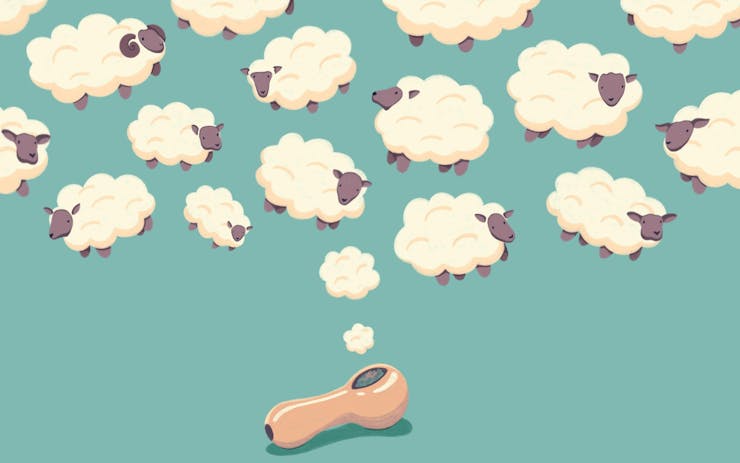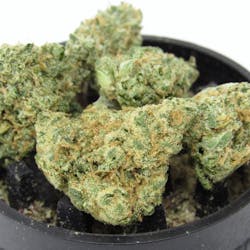Cannabis can be a splendid sleep aid, which is why many consumers keep a go-to favorite by their bedside. Even people with the most stubborn insomnia can find their escape to the dream world with a nice sedating indica. While most consumers are aware that cannabis can help you get a good night’s sleep, there’s a lot more to that relationship than you might think. For example, did you know older dried cannabis makes you sleepier than fresh bud? And did you know that marijuana inhibits dreams?
Get ready to learn a thing or two about the ways cannabis can help or hinder your nightly hibernation.
1. CBD and THC affect sleep differently
By now you probably know that there are different types of strains: some get you high (high-THC, low-CBD), some don’t (high-CBD, low-THC), and others keep your buzz at a minimum (equal or near-equal parts THC and CBD). But which ones are better for sleep?
Most studies on sleep examine high-THC cannabis, so it’s hard to know precisely how CBD affects sleep cycles. Between the dearth of CBD research available and reported anecdotes, we see a mix of reactions. While some animal model studies show that CBD can have a slightly alerting effect, a survey of 72 adults with anxiety and poor sleep found that two-thirds of participants reported improved sleep with CBD after one month of use. However, one-fourth of participants reported worsened symptoms, so questions remain regarding who benefits from CBD and why.
It doesn’t hurt to try different products to see what works. But if CBD doesn’t work for you, consider trying a low dose of THC. Its hypnotic, sedative effects might just be the lullaby you’ve needed.
2. Not all strains are equal

(VasilevKirill/iStock)
Popular opinion would tell you that indica strains tend to induce heavy, sleepy effects and sativas are known to be uplifting and energizing. While this might often be true (just take a look at our top-rated sleepy strains), this shouldn’t be the sole basis of your strain selection.
Take note of which strains have successfully lulled you to sleep. Are they high in THC or CBD? Did they exhibit a particular terpene profile? By keeping close tabs on the chemical composition of your favorite bedtime strains, you’re more likely to make another strain selection that you’re happy with.
3. Natural remedies help maximize cannabis’ sleepy effects
Cannabis is a great way to ready yourself for sleep, but pairing it with other natural sleep aids can make for an even more restful night. “Other terpenoids are extremely synergistic with CBN, some in the cannabis plant, some I add from other herbals,” Rev. Dr. deCesare told us. “Hops, chamomile, and lavender contain important terpenes also found in cannabis, but found in much higher concentration. These inclusions in the medical remedy will make for a greatly enhance sedation efficacy.”
Shop highly rated dispensaries near you
Showing you dispensaries nearSo next time you bust out your favorite sleepy strain, think about pairing it with a cup of chamomile tea or a lavender bubble bath. Melatonin, 5-HTP, and valerian root supplements may also help improve your sleep quality.
4. Cannabis can help you fall asleep faster

(Linda Raymond/iStock)
Given its ability to quell stress and relax physically, it should come as no surprise that cannabis can help you fall asleep faster. This can be especially true for those treating pain, insomnia, PTSD, multiple sclerosis, or other conditions that interfere with the ability to fall asleep as cannabis relieves many bothersome symptoms. It’s worth noting that cannabis-infused edibles take longer to kick in than inhalation methods, but their effects can last several hours and help you stay asleep longer.
5. Nighttime cannabis use may cause a “hangover”
Ever notice that your head might feel a little groggy in the morning after your nightcap? Cannabis can cause mild “hangovers” – no, you won’t be hunched over a toilet while daggers stab at your head, but you might feel a little foggy, dehydrated, lethargic, dry-eyed, or congested. This phenomenon may have never happened to you (high-five). Others have experienced bad hangovers from smoking low-grade or pesticide-riddled cannabis. The best way to avoid a bad morning is to buy clean/tested cannabis, drink lots of water, eat healthy foods, and refrain from overindulging. Nurse a hangover much like you would an alcohol hangover – water, exercise, vitamins, etc.
6. Cannabis inhibits REM sleep and dreaming
One thing you may find yourself missing while regularly consuming cannabis is dreams. Dreams occur during the final stage of your sleep cycle called REM (rapid eye movement) sleep. Cannabis use before bedtime is shown to reduce the time spent in REM, which means you won’t have as many dreams or as vivid dreams. However, if you halt long-term cannabis use, you’re likely to experience “REM rebound” in which you tend to have more dreams that are more lucid in nature.
7. Cannabis may promote better breathing
Sleep apnea is a sleep condition characterized by frequent obstructions of breath, with lapses that can last anywhere from a few seconds to several minutes. As you can imagine, sleep apnea causes the individual to wake up many times over the course of the night, and leads to a myriad of unpleasant ripple effects like daytime sleepiness, fatigue, headaches, mood disturbances, inattention, increased susceptibility to accident, and other health problems.
Preclinical studies show that cannabis may improve this condition. A 2013 study measured the efficacy of an exogenous cannabinoid known as dronabinol (a THC “mimic”) and noted improvements in 15 out of 17 study participants following 21 days of treatment. Another 2002 study observed THC’s ability to restore respiratory stability by modulating serotonin signaling. We’ll need more confidence from clinical studies to be certain of cannabis’ efficacy, but researchers appear to be off to a good start.
8. Discontinuing long-term use may worsen sleep
If you’ve ever quit or taken a tolerance break after long-term cannabis use, you’re probably familiar with this phenomenon. You might find yourself tossing and turning, waking up frequently, or feeling groggy the next day. A 2008 sleep study found that discontinuing long-term use led to shorter sleep time, less slow wave sleep, worse sleep efficiency, longer sleep onset, shorter REM cycles, and more sleep disruption in abstaining subjects than the drug-free control group. However, researchers acknowledge these findings are limited by a small sample size and the inability to determine causation. In other words, it’s possible the study subjects had used cannabis to treat pre-existing insomnia and ceasing use caused a resurgence of sleepless symptoms.
9. Using cannabis at a young age may cause sleep problems
Using cannabis – particularly before the age of 15 – may cause sleeping problems throughout adulthood, according to a 2014 study that took survey information from 1,811 participants with a history of use. The key word there is “may” – the study was unable to determine whether cannabis caused worsened sleep or if insomniacs are more likely to use cannabis for its sedative effects. More studies are needed to confirm a causal relationship.





